高中英语语法:定语从句课件(102张ppt)
文档属性
| 名称 | 高中英语语法:定语从句课件(102张ppt) |

|
|
| 格式 | pptx | ||
| 文件大小 | 2.9MB | ||
| 资源类型 | 试卷 | ||
| 版本资源 | 人教版(2019) | ||
| 科目 | 英语 | ||
| 更新时间 | 2021-06-07 00:00:00 | ||
图片预览

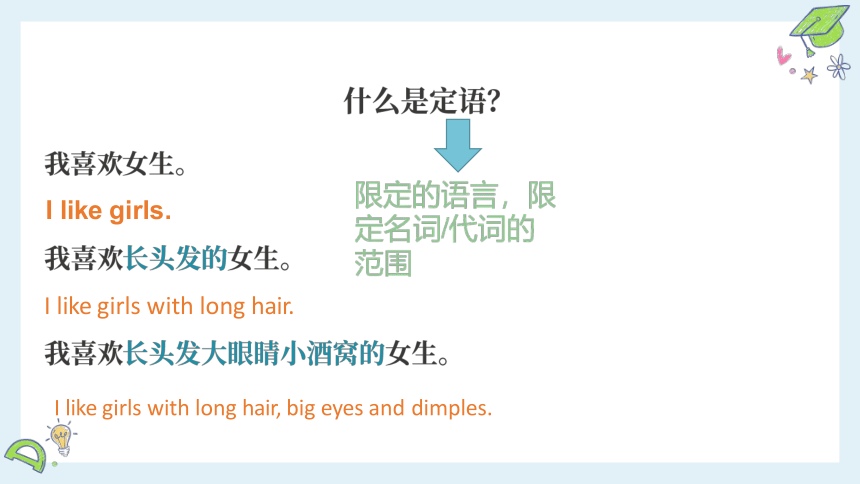
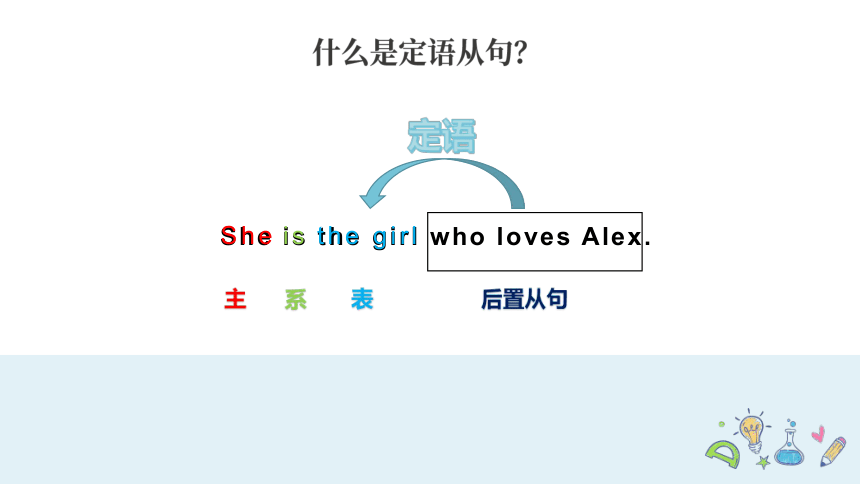
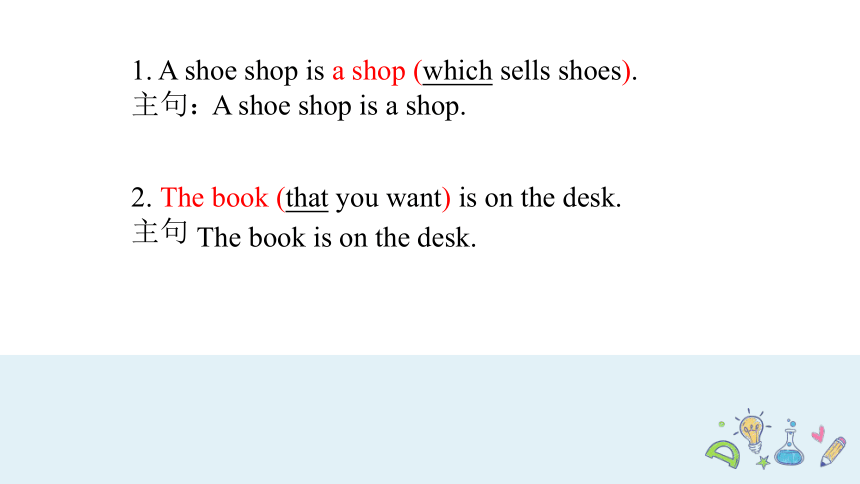
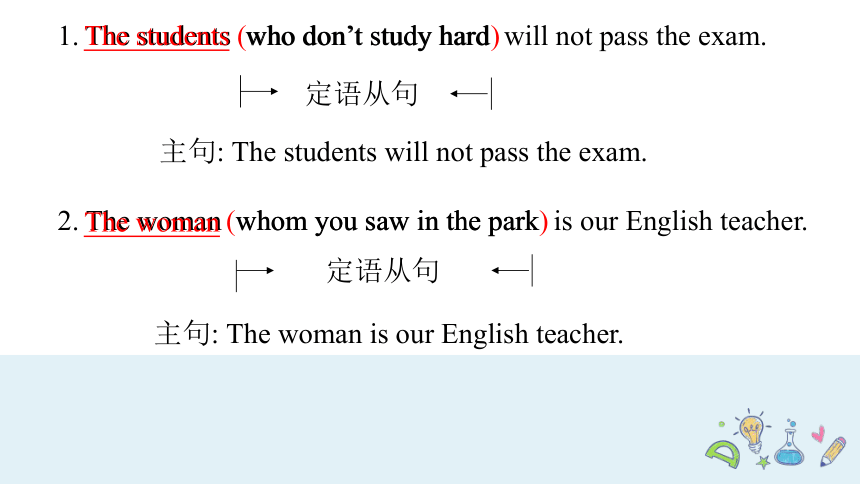
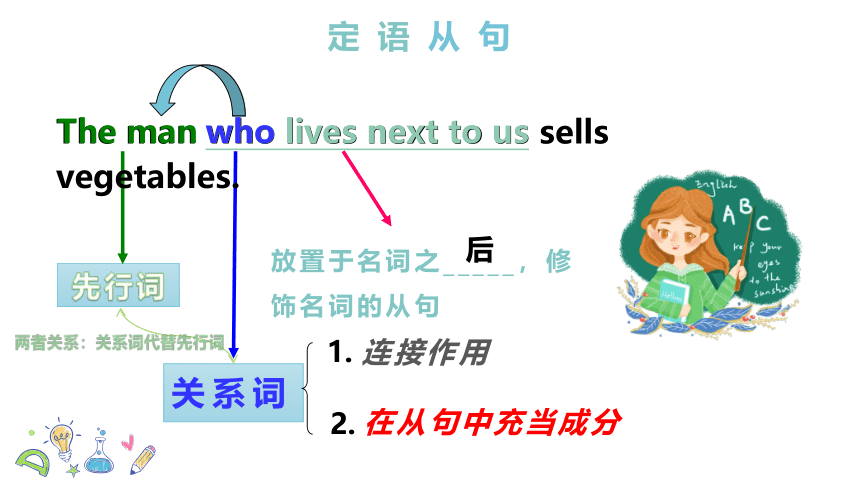
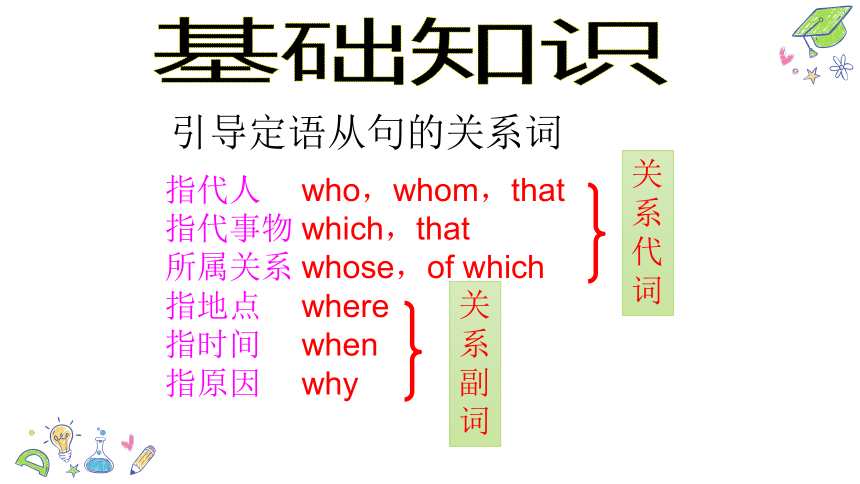
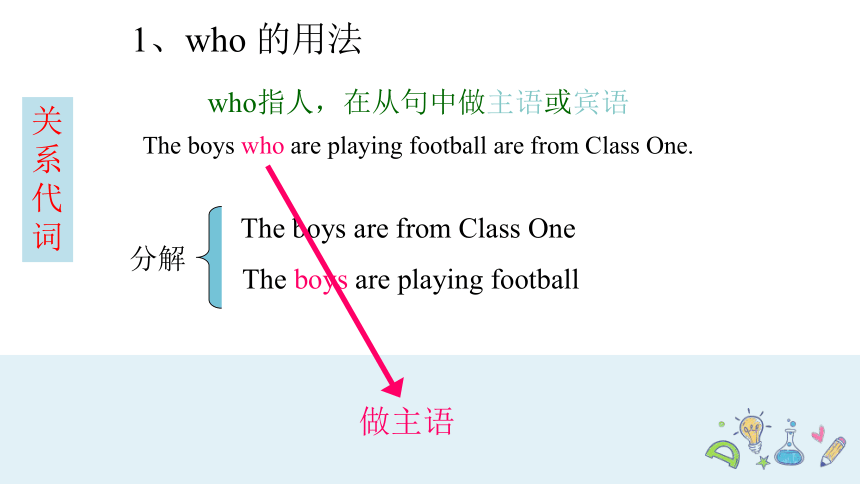
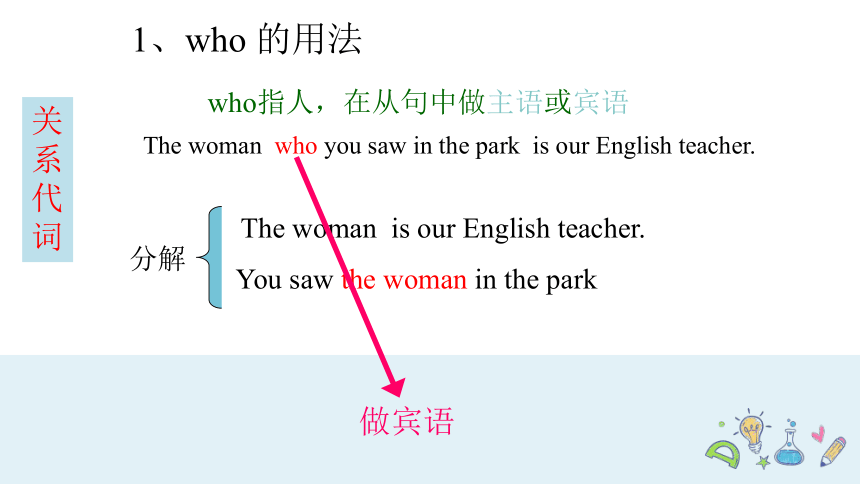
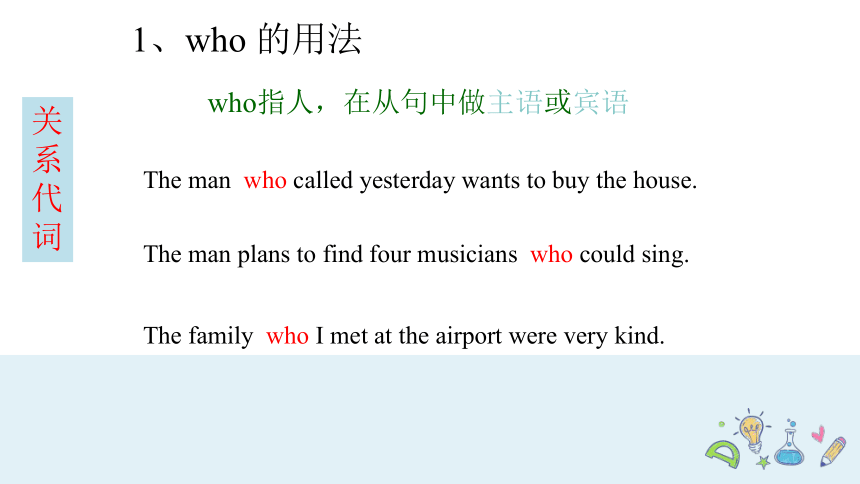
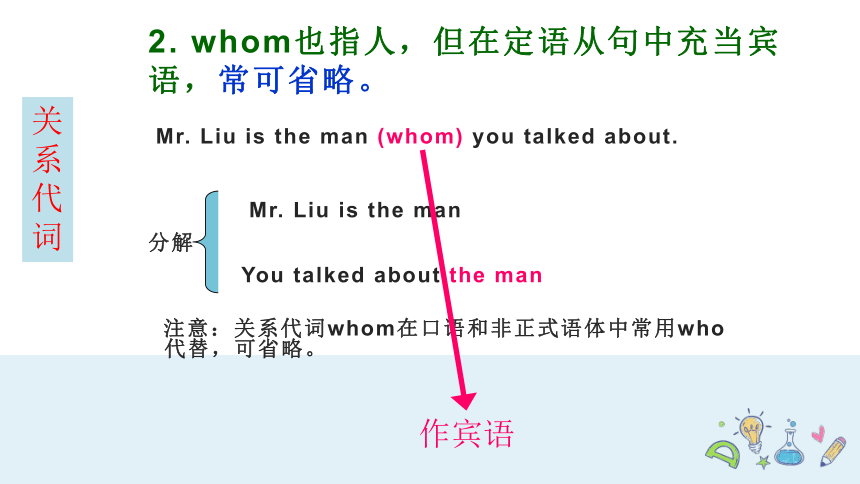
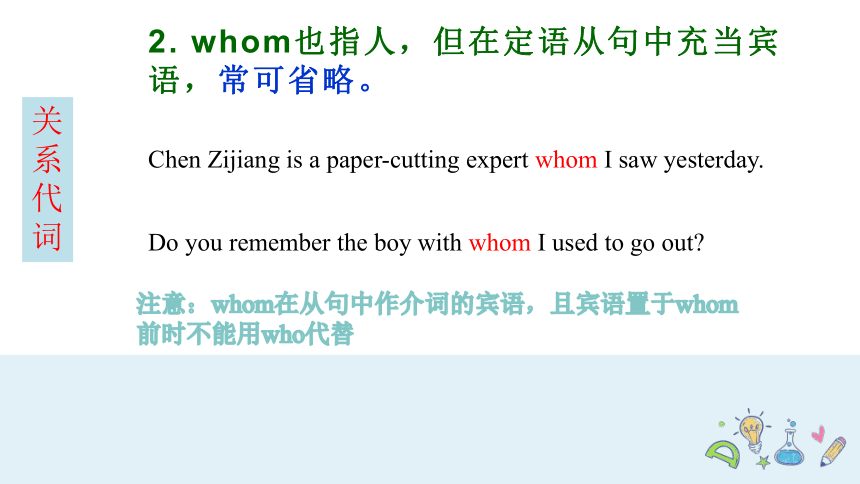
文档简介
(共102张PPT)
定语从句
shirley
主讲人
老师
I like girls.
I like girls with long hair.
I like girls with long hair, big eyes and dimples.
限定的语言,限定名词/代词的范围
She is the girl who loves Alex.
定语
主
系
表
She
is
the girl
后置从句
1. A shoe shop is a shop (which sells shoes).
主句:
A shoe shop is a shop.
2. The book (that you want) is on the desk.
主句
The book is on the desk.
1. The students who don’t study hard will not pass the exam.
主句: The students will not pass the exam.
定语从句
2. The woman whom you saw in the park is our English teacher.
定语从句
主句: The woman is our English teacher.
The students
(who don’t study hard)
The woman
(whom you saw in the park)
定语从句
The man who lives next to us sells vegetables.
先行词
放置于名词之_____,修饰名词的从句
连接作用
1.
2.
在从句中充当成分
后
The man
who lives next to us
who
两者关系:关系词代替先行词
关系词
引导定语从句的关系词
指代人
指代事物
所属关系
指地点
指时间
指原因
who,whom,that
which,that
whose,of which
where
when
why
基础知识
关系代词
关系副词
1、who 的用法
who指人,在从句中做主语或宾语
The boys who are playing football are from Class One.
分解
The boys are from Class One
The boys are playing football
做主语
关系代词
1、who 的用法
who指人,在从句中做主语或宾语
The woman who you saw in the park is our English teacher.
分解
The woman is our English teacher.
You saw the woman in the park
做宾语
关系代词
1、who 的用法
who指人,在从句中做主语或宾语
The man who called yesterday wants to buy the house.
关系代词
The man plans to find four musicians who could sing.
The family who I met at the airport were very kind.
2. whom也指人,但在定语从句中充当宾语,常可省略。
Mr. Liu is the man (whom) you talked about.
Mr. Liu is the man
分解
You talked about the man
注意:关系代词whom在口语和非正式语体中常用who代替,可省略。
作宾语
关系代词
关系代词
Chen Zijiang is a paper-cutting expert whom I saw yesterday.
2. whom也指人,但在定语从句中充当宾语,常可省略。
Do you remember the boy with whom I used to go out
注意:whom在从句中作介词的宾语,且宾语置于whom前时不能用who代替
3. whose 作定语从句的定语.
I know the girl whose mother is a teacher.
分解
I know the girl.
The girl’s mother is a teacher.
作定语
名词所有格
关系代词
3. whose 作定语从句的定语.
He's a man whose opinion I respect.
关系代词
It's the house whose door is painted red.
A shoe shop is a shop which sells shoes.
关系代词
4、which 的用法
which指物,在从句中做主语或宾语
分解
A shoe shop is a shop
The shop sells shoes
做主语
He told us about the countries which he had visited.
关系代词
4、which 的用法
which指物,在从句中做主语或宾语
分解
He told us about the countries
He had visited the countries
做宾语
He prefers groups which play quiet and slow songs.
关系代词
4、which 的用法
which指物,在从句中做主语或宾语
This is the book which he is looking for.
5. that 可以作定语从句的主语和宾语.
可省略
The man who / that is speaking at the meeting is a worker.
The woman (whom / that) they wanted to visit is a teacher.
关系代词
which = that who = that
5. that 可以作定语从句的主语和宾语.
可省略
The students are reading the books which / that were written by Moyan.
The vedio (which/that) we made last year was very interesting.
关系代词
which = that who = that
5. that 可以作定语从句的主语和宾语.
可省略
The woman (who/whom/that) you met on the street worked in a hospital.
The pen (which/that) I bought yesterday is on the desk.
关系代词
which = that who = that
如何选定定语从句关系词
1.分辨主句和定语从句
2.确定定语从句的先行词(人/物/人和物)
3.把先行词带到从句中,看其在定语从句中充当的成分(主语 宾语 定语)
4.若先行词在从句中做主语,宾语或定语则用关系代词。
沙场秋点兵
1、Do you know the man ___ is talking with your father
A. whose B. who C. which
2、The boys ___ the teacher talked to are from Class One.
A. when B. which C. who
3、Those ___ want to go to the museum must be at the school gate at 7 tomorrow morning.
A. who B. which C. whom
由Who 引导的定语从句,在句中做主语\ 宾语
4. The teacher for ____ you are waiting has come.
A. who B. whom C. that
5. The doctor ___ you are looking for is in the room.
A. whom B. what C. which
6. The gentleman ___ you told me yesterday proved to be a thief.
A. who B. about whom C. whom
介词提前时只能用 whom
由Whom 引导的定语从句,在句中做宾语
7. A child ___ parents are dead is called an orphan.
A. which B. his C. whose
8. This book is for the students ___ native(本国的) language is not English.
A. that B. of whom C. whose
9. The boy ___ homework gets an 'A' is the youngest in the group.
A. who B. whose C. that
由Whose 引导的定语从句, 在句中做定语
10、He likes to eat the rice ___ in the south.
A. who is grown B. which is grown
C. when is grown
11、 The key ___ I need can’t be found.
A. which B. who C. what
12、This is the pen ____ he bought yesterday.
A. which B. who C. when
由Which 引导的定语从句, 在句中做主语\ 宾语
that
用关系代词填空:that 、which 、who、 whom 、whose
1.This is the man __________wants to see you.
2. Clock is a thing __________ tells people the time.
3.This is the shirt _________ I bought yesterday.
4. This is the boy with _______he talked.
5. The man _________ leg broke in a game used to be a football player.
who /that
which /that
which /that
whom
whose
用关系代词填空:that 、which 、who、 whom 、whose
6.I have a friend __________ likes listening to classical music.
7. Yesterday Emily was wearing the new dress __________ I gave her.
8.My parents live in a house _________ is more than 100 years old.
9. Kevin is reading a book _______ is too difficult for him.
who /that
which /that
which /that
which/that
关系副词
where when why
1、where 作地点状语
I want to know the place.
I was born there.
I want to know the place where (= in which) I was born.
where = 介词 + which
The table where (= at which ) she is sitting is a new one.
关系副词
1、where 作地点状语
This is the town where (= in which) I was born.
where = 介词 + which
I forgot the place where (= in which ) I had hidden the box.
关系副词
It is the year.
The Olympic Games begins in the year.
when 作时间状语:
2 .时间名词+when+定语从句
She will never forget the day when (=on which) she won the game.
When = 介词 + which
It is the year when (= in which) the Olympic Games begins.
She will never forget the day.
She won the game on that day.
关系副词
when 作时间状语:
2 .时间名词+when+定语从句
I still remember the day when (=on which) I first came to Beijing.
When = 介词 + which
The year when (= in which) the earthquake happened was 1976.
关系副词
3.表原因的名词reason + why + 定语从句
(why只用于reason之后的限制性定语从句中,在定语从句中作原因状语。)
This is the reason he gave his teacher in the classroom.
The reason he did not go to school is that he was ill.
which/that
why
This is the reason.
He gave his teacher the reason in the classroom.
why = for which
关系副词
3.表原因的名词reason + why + 定语从句
(why只用于reason之后的限制性定语从句中,在定语从句中作原因状语。)
Is it the reason he refused our help
I don't want to hear any reason you are absent(缺席).
why
why
why = for which
关系副词
when where和why都可以替换成“介词 + which”
Do you still remember the day on which/when we first met in Nantong
This is the room in which/where we lived last year.
Do you know the reason for which/why he didn't go to Mary’s birthday party.
(on which=when)
(in which=where)
(for which=why)
关系副词
关系副词小结
when= on(in at during...) which
where=in(at on...) which
why=for which
关
系
副
词
where when why
1. This is the place ___ John was born
A. which B. where C. when
2. The days ___ we spent in Tokyo together will never be forgotten.
A. when B. which C. on which
3. Don't forget the day ___ you came to Beijing University.
A. when B. that C. at which
4. Nobody knows the reason ___ she didn't come to the meeting.
A. which B. why C. when
5. This is the house ___ our beloved Premier Zhou once lived and worked.
A. which B. where C. when
6. He has forgotten the day ___ he arrived.
A. when B. that C. at which
7. Bob took me to see the house ___ I would live.
A. where B. when C. why
8. I want to explain the reason ___ I didn't come.
A. why B. where C. when
9. I'll never forget the days ___ we studied together.
A. in which B. that C. when
如何选定定语从句关系词
1.分辨主句和定语从句
2.确定定语从句的先行词(人/物/人和物)
3.把先行词带到从句中,看其在定语从句中充当的成分(主语 宾语 定语 状语)
4.若先行词在从句中做主语,宾语或定语则用关系代词,如果做状语则用关系副词。
特殊情况
He is the best man that/who/whom/--- I have met.
4. This is the best film that has been made by children.
1. Is there anything that you want to buy in town / A notebook is all that I need.
2. The only thing that matters is to find our way home.
5.The first book that I chose yesterday is interesting.
3.This is the very/right book that I want to buy.
just the book
(人不受限制)
当先行词为物时只用that的情况
1.当先行词是All, much, none, everything, anything, something等不定代词,且指物时
2.当先行词被the only, the very, all, no等词修饰时
3. 当先行词是序数词或被序数词/最高级或被最高级修饰时
all, everything, anything, nothing, little, any, no, the only, the very…, the
xxxest, the xxxth…
You are the most beautiful girl that I have ever seen.
他没那么有钱啦!He is not that rich!
6. They are talking about the people and the school that/--- they have visited.
7. Which is the book that/--- you bought
4.当先行词中有人又有物时
5.主句是who/which引导的特殊疑问句,避免重复只用that
eg:Who is the man that is talking with Mr. Black
1. 由who引导的特殊疑问句,为避免重复只用that
当先行词为人时只用that的情况
1. All _____ is needed is a notebook.
A. which B. that C. what
2. Finally, the thief handed everything ____ he had stolen to the police.
A. which B. what C. that
先行词是不定代词 all, few, little, much, something, nothing, anything只能用that引导
3. It’s the most boring film ___ I have ever seen.
A. which B. that C. whose
4. This is the first car ___ arrived this morning.
A. which B. who C. that
先行词被序数词或形容词最高级修饰时只能用that引导
5. I know all people ___ are from that village.
A. who B. that C. whose
6. There is no water ___ is needed badly.
A. which B. who C. that
7. Please take any seat ___ is free.
A. which B. that C. in which
先行词被all, any, every, few, little, no, some 等修饰时只能用that引导
8. That is the very book ___ I was looking for.
A. who B. that C. which
9. After the fire in his house, the old car is the only thing ___ he owns.
A. who B. that C. which
先行词被the only, the very, the same, the last 等修饰时只能用that引导
10. We are talking about the people and the places ___ we have visited in the countryside.
A. who B. that C. which
先行词被既有人又有物时只能用that引导
11. Who is the worker ___ took some pictures of the factory
A. who B. that C. which
主句已有who或which时,只能用that 引导
There is an old man who wants to see you.
eg: 那儿有老人想要见你。
2.在there be句型中,先行词为人只用who
1.先行词为one,ones,anyone,those,he时,只用who
当先行词为人时,只用who的情况
eg:He understood those who needed help.
eg:Besides our family, our friends are the ones who share our joy and sorrow with us.
先行词与从句的主语构成从属关系
= of which the door
= the door of which
They live in a house whose door is blue.
eg: 他们住在一间门是兰色的房子里。
= of whom the daughter
= the daughter of whom
eg: He is the police whose daughter went abroad.
介词加which结构
由与前面名词的固定搭配确定
i.e.
the day on which
由定从中谓语动词的固定搭配确定
i.e.
This is the man to whom I turned yesterday.
介词的确定
China has hundreds of islands(岛), the largest _____which is Taiwan.
of
He is the person_____whom you will write.
to
_____whom the book was written.
by
_____whom I learnt a lot.
from
_____whom I worked in the factory.
with
_____ which there are few new words.
This is the book _____ which I learned a lot.
from
in
_______which there is a factory.
This is the river
__________we often have a walk.
______________a bridge was built.
_______ there is a boat.
by/beside
on which
over/across which
along which
非限定性定语从句
Restrictive Clause
限定性定语从句
This is the man who had once stolen my wallet.
去掉限定定从,主句的意思不一样。
定从是告知信息 inform 的功能。
Non-restrictive Attributive Clause
This man, who had once stolen my wallet, wants to work in your company.
去掉非限定从,主句的意思仍然不变,但是情感有差异。
非限定从,表暗示 imply 的功能。
非限定性定语从句
他将去北京看望妻子,她在北京工作.
(没有逗号翻译成:他将去看望在北京工作的那个妻子.)
特征:用逗号隔开,起补充说明作用,译成两句话.
He will go to see his wife, who is in Beijing.
He passed the exam, which makes me happy.
特征:which可代指前面整句话,不可用that.
定语从句分限制性定语从句和非限制性定语从句。
非限制性定语从句的先行词和关系词常用逗号隔开,且不能用that引导。
e.g.
I love my father, who is good to me.
Smoking, which is a bad habit,is very popular.
1. Watch the girl and her dog _____
are crossing the bridge!
which B. who
C. they D. that
D
Exercise
单项选择
The man _____ you just talked to was
a friend of mine.
A. whom B. which D. whose D. where
2. The car ____ my father bought me is
very expensive.
A. who B. whose C. that D. where
3. The doctor ____ is leaving for Africa
next month.
A. the nurse is talking to him
B. whom the nurse is talking to
C. the nurse is talking to
D. that the nurse is talking
A
C
B
4. Ms. Ji ____ loves us very much is our math
teacher.
A. who B. whom C. whose D. which
5. The bike ________was stolen.
A. which my mother buys me
B. who my mother bought me
C. which my mother bought me
D. that my mother buys me
6. The dog ___ owner is an old man is very lovely.
A. which B. whose C. that D. who
A
C
B
1. More people could afford the books __________were produced on a printing press.
2. Some of my friends __________ went on to university can't find work.
3. Hansel is a smart boy _________ often comes up with good ideas.
4. I hate the dogs _________ live in the next house.
5. Yesterday Mr.Green went to his hometown and visited the old house_________ he was born in.
6. Everything _________ you learn becomes a part of you and changes you, so learn wisely and learn well.
which/that
who
who /that
that/which
that/which
that
2. Yesterday Emily was wearing the
new dress __________ I gave her.
Exercise
1. I have a friend ________ likes listening to classical music.
who/that
which/that
3. Kevin is reading a book __________
is too difficult for him.
which/that
4. My parents live in a house__________
is more than 100 years old.
5. The boy with _______ John talked is my brother.
which/that
whom
6. Kevin is reading a book __________
is too difficult for him.
which/that
1. Is there anything __________you want to buy in the town.
2. All __________ we can do is to study hard.
3. The first one _________ stands up is a little boy.
that
that
that
I have lots of friends, some/none of _____are friendly.
I have lots of friends. Some of ____are friendly.
I have lots of friends, and some of ____are friendly.
whom
them
them
Tips:
1. 关系词的选用,取决于先行词在从句中的成分,而不是它本身。
2.定语从句不能滥用。如果能用简单句表达出来的东西就不用从句来表达。
定语从句总结
各个关系代词和关系副词的具体用法:
who 指人,在定语从句中作主语。
whom 指人,在定语从句中作宾语。
whose 指人,在定语从句中作定语。
which 指物,在定语从中作主语或宾语。
that 多指物,有时也指人,在定语从句中作主语或宾语。
when 指时间,在定语从句中作状语。
where 指地点,在定语从句中作状语。
why 指原因,在定语从句中作状语。
1. 只能使用that,不用which 的情况:
(1) 先行词是few, little, nothing, everything, anything, all, 等不定代词时。例如:All that he said is true.
(2) 先行词被only, no, any, all,等词修饰时。例如:He is the only foreigner that has been to that place.
(3) 先行词是序数词或被序数词修饰的词。例如:He was the second (person) that told me the secret.
(4) 先行词是形容词最高级或被形容词最高级修饰的词。如:This is the best book (that) I have read this year.
(5) 先行词既包括人又包括物时。例如: He talked about the people and the things he remembered.
均
表
强
调
2. 只能用which,不用that 的情况:
(1) 在非限制性定语从中。
如:The meeting was put off, which was exactly what we wanted.
(2) 定语从句由介词+关系代词引导,先行词是物时。
如:The thing about which he is talking is of great importance.
合并同类项
That man is crying in the car.
句2:
I know the man.
句1:
两个句子
找出相同词,确定主从句
I know the man the man is crying in the car.
The man is crying in the car.
句2:
I know the man.
句1:
先行词
用词代替
I know the man who is crying in the car.
关系代词:
1、代指 the man
2、指示主句与从句的关系,从句低一级
先行词
句1:I do not like books.
句2:Books do not have pictures.
I do not like books which do not have pictures.
I do not like books books do not have pictures.
两个句子
关系代词:
1、代指 books
2、指示主句与从句的关系,从句低一级
先行词
粗暴合并
替换同类项
句1:I have a puppy dog.
句2:A puppy dog’s eyes are blue.
I have a puppy dog whose eyes are blue.
I have a puppy dog a puppy dog’s eyes are blue.
两个句子
关系代词:
1、代指 dog's
2、指示主句与从句的关系,从句低一级
先行词
粗暴合并
替换同类项
句1:I know the boy.
句2:You like the boy.
I know the boy you like who/whom/that.
I know the boy who/whom/that/省略 you like.
I know the boy you like the boy.
两个句子
关系代词:
1、代指 the boy
2、指示主句与从句的关系,从句低一级
先行词
粗暴合并
替换同类项
where/when/why
介词+which = where/when/why
句1:
句2:
I really hate the city I met her in the city.
两个句子
关系代词:
1、代指 the city
2、指示主句与从句的关系,从句低一级
先行词
粗暴合并
替换同类项
I really hate the city.
I met her in the city.
I really hate the city I met her in which.
I really hate the city in which I met her.
……
I really hate the city in which I met her.
∵ in which where
∴
I really hate the city where I met her.
句1:
句2:
I forgot the day you came on the day.
两个句子
关系代词:
1、代指 the day
2、指示主句与从句的关系,从句低一级
先行词
粗暴合并
替换同类项
I forgot the day.
You came on the day.
I forgot the day you came on which.
I forgot the day on which you came.
……
I forgot the day on which you came.
∵ on which when
∴
I forgot the day when you came.
句1:
句2:
I can't understand the reason she left me for the reason.
两个句子
关系代词:
1、代指 the reason
2、指示主句与从句的关系,从句低一级
先行词
粗暴合并
替换同类项
I can't understand the reason.
She left me for the reason.
I can't understand the reason she left me for which.
I can't understand the reason for which she left me.
……
I can't understand the reason for which she left me.
∵ for which why
∴
I can't understand the reason why she left me.
You came on the day.
She left me for the reason.
I met her in the city.
为什么会出现介词?
同类项在句2中,是状语的一部分。
如果地点/时间/原因,在句2中充当主语/宾语
两个句子
粗暴合并
替换同类项
句1:
句2:
I really hate the city.
The city was hit by the typhoon.
I really hate the city which was hit by the typhoon.
两个句子
粗暴合并
替换同类项
句1:
句2:
I forgot the day.
You cannot forget the day.
I forgot the day which you cannot forget.
两个句子
粗暴合并
替换同类项
句1:
句2:
I cannot understand the reason.
You said the reason.
I cannot understand the reason which you said.
句1:
句2:
This is the book I am looking for the book.
两个句子
关系代词:
1、代指 the book
2、指示主句与从句的关系,从句低一级
先行词
粗暴合并
替换同类项
This is the book.
I am looking for the book.
This is the book I am looking for which.
This is the book which I am looking for.
The boy is holding a dog .
He has golden hair .
The boy is holding a dog .
His hair is golden .
The boy is Jim .
The boy is holding a dog .
The boy who has golden hair is holding a dog.
The boy whose hair is golden is holding a dog .
The boy who is holding a dog is Jim .
He is one of the
persons in the
film.
The police are
looking for him.
He that/whom/who the police are looking for
is one of the persons.
This is a very interesting
game .
Tom played it last night.
This is a very interesting game which/that
Tom played last night.
Oct. 1, 1949 the day found
Oct.1,1949 is the day when/ on which the PRC was founded.
It is a city where/in which people are living happily.
It
a city
people live happily
1. The girl is happy. She won the race.
2. The student is from America. He sits next to me.
3. The boy was not badly hurt. The boy fell from a tree.
4. The taxi driver was friendly. He took me to the airport.
5. Johnny isn’t home yet. That worried me.
6. She told me her address. I wrote it down on a piece of paper.
7. The woman lives next door. She is a famous dancer.
The woman who/that is a famous dancer lives next door.
The girl who/that won the race is happy
The students who/that sits next to me is from America
The boy who/that fell from a tree was not badly hurt.
The taxi driver who/that took me to the airport was friendly.
Johnny isn't home yet, which worried me.
She told me her address (which/that) I wrote down on a pieve of paper.
谢谢观赏
Thank You For Watching
the/a way (in which) …
the/a reason (for which) …
Just gonna stand there and hear me cry, but that’s alright because I love
the way you lie, love the way you lie…
Give me a reason I shall let you go.
定语从句
shirley
主讲人
老师
I like girls.
I like girls with long hair.
I like girls with long hair, big eyes and dimples.
限定的语言,限定名词/代词的范围
She is the girl who loves Alex.
定语
主
系
表
She
is
the girl
后置从句
1. A shoe shop is a shop (which sells shoes).
主句:
A shoe shop is a shop.
2. The book (that you want) is on the desk.
主句
The book is on the desk.
1. The students who don’t study hard will not pass the exam.
主句: The students will not pass the exam.
定语从句
2. The woman whom you saw in the park is our English teacher.
定语从句
主句: The woman is our English teacher.
The students
(who don’t study hard)
The woman
(whom you saw in the park)
定语从句
The man who lives next to us sells vegetables.
先行词
放置于名词之_____,修饰名词的从句
连接作用
1.
2.
在从句中充当成分
后
The man
who lives next to us
who
两者关系:关系词代替先行词
关系词
引导定语从句的关系词
指代人
指代事物
所属关系
指地点
指时间
指原因
who,whom,that
which,that
whose,of which
where
when
why
基础知识
关系代词
关系副词
1、who 的用法
who指人,在从句中做主语或宾语
The boys who are playing football are from Class One.
分解
The boys are from Class One
The boys are playing football
做主语
关系代词
1、who 的用法
who指人,在从句中做主语或宾语
The woman who you saw in the park is our English teacher.
分解
The woman is our English teacher.
You saw the woman in the park
做宾语
关系代词
1、who 的用法
who指人,在从句中做主语或宾语
The man who called yesterday wants to buy the house.
关系代词
The man plans to find four musicians who could sing.
The family who I met at the airport were very kind.
2. whom也指人,但在定语从句中充当宾语,常可省略。
Mr. Liu is the man (whom) you talked about.
Mr. Liu is the man
分解
You talked about the man
注意:关系代词whom在口语和非正式语体中常用who代替,可省略。
作宾语
关系代词
关系代词
Chen Zijiang is a paper-cutting expert whom I saw yesterday.
2. whom也指人,但在定语从句中充当宾语,常可省略。
Do you remember the boy with whom I used to go out
注意:whom在从句中作介词的宾语,且宾语置于whom前时不能用who代替
3. whose 作定语从句的定语.
I know the girl whose mother is a teacher.
分解
I know the girl.
The girl’s mother is a teacher.
作定语
名词所有格
关系代词
3. whose 作定语从句的定语.
He's a man whose opinion I respect.
关系代词
It's the house whose door is painted red.
A shoe shop is a shop which sells shoes.
关系代词
4、which 的用法
which指物,在从句中做主语或宾语
分解
A shoe shop is a shop
The shop sells shoes
做主语
He told us about the countries which he had visited.
关系代词
4、which 的用法
which指物,在从句中做主语或宾语
分解
He told us about the countries
He had visited the countries
做宾语
He prefers groups which play quiet and slow songs.
关系代词
4、which 的用法
which指物,在从句中做主语或宾语
This is the book which he is looking for.
5. that 可以作定语从句的主语和宾语.
可省略
The man who / that is speaking at the meeting is a worker.
The woman (whom / that) they wanted to visit is a teacher.
关系代词
which = that who = that
5. that 可以作定语从句的主语和宾语.
可省略
The students are reading the books which / that were written by Moyan.
The vedio (which/that) we made last year was very interesting.
关系代词
which = that who = that
5. that 可以作定语从句的主语和宾语.
可省略
The woman (who/whom/that) you met on the street worked in a hospital.
The pen (which/that) I bought yesterday is on the desk.
关系代词
which = that who = that
如何选定定语从句关系词
1.分辨主句和定语从句
2.确定定语从句的先行词(人/物/人和物)
3.把先行词带到从句中,看其在定语从句中充当的成分(主语 宾语 定语)
4.若先行词在从句中做主语,宾语或定语则用关系代词。
沙场秋点兵
1、Do you know the man ___ is talking with your father
A. whose B. who C. which
2、The boys ___ the teacher talked to are from Class One.
A. when B. which C. who
3、Those ___ want to go to the museum must be at the school gate at 7 tomorrow morning.
A. who B. which C. whom
由Who 引导的定语从句,在句中做主语\ 宾语
4. The teacher for ____ you are waiting has come.
A. who B. whom C. that
5. The doctor ___ you are looking for is in the room.
A. whom B. what C. which
6. The gentleman ___ you told me yesterday proved to be a thief.
A. who B. about whom C. whom
介词提前时只能用 whom
由Whom 引导的定语从句,在句中做宾语
7. A child ___ parents are dead is called an orphan.
A. which B. his C. whose
8. This book is for the students ___ native(本国的) language is not English.
A. that B. of whom C. whose
9. The boy ___ homework gets an 'A' is the youngest in the group.
A. who B. whose C. that
由Whose 引导的定语从句, 在句中做定语
10、He likes to eat the rice ___ in the south.
A. who is grown B. which is grown
C. when is grown
11、 The key ___ I need can’t be found.
A. which B. who C. what
12、This is the pen ____ he bought yesterday.
A. which B. who C. when
由Which 引导的定语从句, 在句中做主语\ 宾语
that
用关系代词填空:that 、which 、who、 whom 、whose
1.This is the man __________wants to see you.
2. Clock is a thing __________ tells people the time.
3.This is the shirt _________ I bought yesterday.
4. This is the boy with _______he talked.
5. The man _________ leg broke in a game used to be a football player.
who /that
which /that
which /that
whom
whose
用关系代词填空:that 、which 、who、 whom 、whose
6.I have a friend __________ likes listening to classical music.
7. Yesterday Emily was wearing the new dress __________ I gave her.
8.My parents live in a house _________ is more than 100 years old.
9. Kevin is reading a book _______ is too difficult for him.
who /that
which /that
which /that
which/that
关系副词
where when why
1、where 作地点状语
I want to know the place.
I was born there.
I want to know the place where (= in which) I was born.
where = 介词 + which
The table where (= at which ) she is sitting is a new one.
关系副词
1、where 作地点状语
This is the town where (= in which) I was born.
where = 介词 + which
I forgot the place where (= in which ) I had hidden the box.
关系副词
It is the year.
The Olympic Games begins in the year.
when 作时间状语:
2 .时间名词+when+定语从句
She will never forget the day when (=on which) she won the game.
When = 介词 + which
It is the year when (= in which) the Olympic Games begins.
She will never forget the day.
She won the game on that day.
关系副词
when 作时间状语:
2 .时间名词+when+定语从句
I still remember the day when (=on which) I first came to Beijing.
When = 介词 + which
The year when (= in which) the earthquake happened was 1976.
关系副词
3.表原因的名词reason + why + 定语从句
(why只用于reason之后的限制性定语从句中,在定语从句中作原因状语。)
This is the reason he gave his teacher in the classroom.
The reason he did not go to school is that he was ill.
which/that
why
This is the reason.
He gave his teacher the reason in the classroom.
why = for which
关系副词
3.表原因的名词reason + why + 定语从句
(why只用于reason之后的限制性定语从句中,在定语从句中作原因状语。)
Is it the reason he refused our help
I don't want to hear any reason you are absent(缺席).
why
why
why = for which
关系副词
when where和why都可以替换成“介词 + which”
Do you still remember the day on which/when we first met in Nantong
This is the room in which/where we lived last year.
Do you know the reason for which/why he didn't go to Mary’s birthday party.
(on which=when)
(in which=where)
(for which=why)
关系副词
关系副词小结
when= on(in at during...) which
where=in(at on...) which
why=for which
关
系
副
词
where when why
1. This is the place ___ John was born
A. which B. where C. when
2. The days ___ we spent in Tokyo together will never be forgotten.
A. when B. which C. on which
3. Don't forget the day ___ you came to Beijing University.
A. when B. that C. at which
4. Nobody knows the reason ___ she didn't come to the meeting.
A. which B. why C. when
5. This is the house ___ our beloved Premier Zhou once lived and worked.
A. which B. where C. when
6. He has forgotten the day ___ he arrived.
A. when B. that C. at which
7. Bob took me to see the house ___ I would live.
A. where B. when C. why
8. I want to explain the reason ___ I didn't come.
A. why B. where C. when
9. I'll never forget the days ___ we studied together.
A. in which B. that C. when
如何选定定语从句关系词
1.分辨主句和定语从句
2.确定定语从句的先行词(人/物/人和物)
3.把先行词带到从句中,看其在定语从句中充当的成分(主语 宾语 定语 状语)
4.若先行词在从句中做主语,宾语或定语则用关系代词,如果做状语则用关系副词。
特殊情况
He is the best man that/who/whom/--- I have met.
4. This is the best film that has been made by children.
1. Is there anything that you want to buy in town / A notebook is all that I need.
2. The only thing that matters is to find our way home.
5.The first book that I chose yesterday is interesting.
3.This is the very/right book that I want to buy.
just the book
(人不受限制)
当先行词为物时只用that的情况
1.当先行词是All, much, none, everything, anything, something等不定代词,且指物时
2.当先行词被the only, the very, all, no等词修饰时
3. 当先行词是序数词或被序数词/最高级或被最高级修饰时
all, everything, anything, nothing, little, any, no, the only, the very…, the
xxxest, the xxxth…
You are the most beautiful girl that I have ever seen.
他没那么有钱啦!He is not that rich!
6. They are talking about the people and the school that/--- they have visited.
7. Which is the book that/--- you bought
4.当先行词中有人又有物时
5.主句是who/which引导的特殊疑问句,避免重复只用that
eg:Who is the man that is talking with Mr. Black
1. 由who引导的特殊疑问句,为避免重复只用that
当先行词为人时只用that的情况
1. All _____ is needed is a notebook.
A. which B. that C. what
2. Finally, the thief handed everything ____ he had stolen to the police.
A. which B. what C. that
先行词是不定代词 all, few, little, much, something, nothing, anything只能用that引导
3. It’s the most boring film ___ I have ever seen.
A. which B. that C. whose
4. This is the first car ___ arrived this morning.
A. which B. who C. that
先行词被序数词或形容词最高级修饰时只能用that引导
5. I know all people ___ are from that village.
A. who B. that C. whose
6. There is no water ___ is needed badly.
A. which B. who C. that
7. Please take any seat ___ is free.
A. which B. that C. in which
先行词被all, any, every, few, little, no, some 等修饰时只能用that引导
8. That is the very book ___ I was looking for.
A. who B. that C. which
9. After the fire in his house, the old car is the only thing ___ he owns.
A. who B. that C. which
先行词被the only, the very, the same, the last 等修饰时只能用that引导
10. We are talking about the people and the places ___ we have visited in the countryside.
A. who B. that C. which
先行词被既有人又有物时只能用that引导
11. Who is the worker ___ took some pictures of the factory
A. who B. that C. which
主句已有who或which时,只能用that 引导
There is an old man who wants to see you.
eg: 那儿有老人想要见你。
2.在there be句型中,先行词为人只用who
1.先行词为one,ones,anyone,those,he时,只用who
当先行词为人时,只用who的情况
eg:He understood those who needed help.
eg:Besides our family, our friends are the ones who share our joy and sorrow with us.
先行词与从句的主语构成从属关系
= of which the door
= the door of which
They live in a house whose door is blue.
eg: 他们住在一间门是兰色的房子里。
= of whom the daughter
= the daughter of whom
eg: He is the police whose daughter went abroad.
介词加which结构
由与前面名词的固定搭配确定
i.e.
the day on which
由定从中谓语动词的固定搭配确定
i.e.
This is the man to whom I turned yesterday.
介词的确定
China has hundreds of islands(岛), the largest _____which is Taiwan.
of
He is the person_____whom you will write.
to
_____whom the book was written.
by
_____whom I learnt a lot.
from
_____whom I worked in the factory.
with
_____ which there are few new words.
This is the book _____ which I learned a lot.
from
in
_______which there is a factory.
This is the river
__________we often have a walk.
______________a bridge was built.
_______ there is a boat.
by/beside
on which
over/across which
along which
非限定性定语从句
Restrictive Clause
限定性定语从句
This is the man who had once stolen my wallet.
去掉限定定从,主句的意思不一样。
定从是告知信息 inform 的功能。
Non-restrictive Attributive Clause
This man, who had once stolen my wallet, wants to work in your company.
去掉非限定从,主句的意思仍然不变,但是情感有差异。
非限定从,表暗示 imply 的功能。
非限定性定语从句
他将去北京看望妻子,她在北京工作.
(没有逗号翻译成:他将去看望在北京工作的那个妻子.)
特征:用逗号隔开,起补充说明作用,译成两句话.
He will go to see his wife, who is in Beijing.
He passed the exam, which makes me happy.
特征:which可代指前面整句话,不可用that.
定语从句分限制性定语从句和非限制性定语从句。
非限制性定语从句的先行词和关系词常用逗号隔开,且不能用that引导。
e.g.
I love my father, who is good to me.
Smoking, which is a bad habit,is very popular.
1. Watch the girl and her dog _____
are crossing the bridge!
which B. who
C. they D. that
D
Exercise
单项选择
The man _____ you just talked to was
a friend of mine.
A. whom B. which D. whose D. where
2. The car ____ my father bought me is
very expensive.
A. who B. whose C. that D. where
3. The doctor ____ is leaving for Africa
next month.
A. the nurse is talking to him
B. whom the nurse is talking to
C. the nurse is talking to
D. that the nurse is talking
A
C
B
4. Ms. Ji ____ loves us very much is our math
teacher.
A. who B. whom C. whose D. which
5. The bike ________was stolen.
A. which my mother buys me
B. who my mother bought me
C. which my mother bought me
D. that my mother buys me
6. The dog ___ owner is an old man is very lovely.
A. which B. whose C. that D. who
A
C
B
1. More people could afford the books __________were produced on a printing press.
2. Some of my friends __________ went on to university can't find work.
3. Hansel is a smart boy _________ often comes up with good ideas.
4. I hate the dogs _________ live in the next house.
5. Yesterday Mr.Green went to his hometown and visited the old house_________ he was born in.
6. Everything _________ you learn becomes a part of you and changes you, so learn wisely and learn well.
which/that
who
who /that
that/which
that/which
that
2. Yesterday Emily was wearing the
new dress __________ I gave her.
Exercise
1. I have a friend ________ likes listening to classical music.
who/that
which/that
3. Kevin is reading a book __________
is too difficult for him.
which/that
4. My parents live in a house__________
is more than 100 years old.
5. The boy with _______ John talked is my brother.
which/that
whom
6. Kevin is reading a book __________
is too difficult for him.
which/that
1. Is there anything __________you want to buy in the town.
2. All __________ we can do is to study hard.
3. The first one _________ stands up is a little boy.
that
that
that
I have lots of friends, some/none of _____are friendly.
I have lots of friends. Some of ____are friendly.
I have lots of friends, and some of ____are friendly.
whom
them
them
Tips:
1. 关系词的选用,取决于先行词在从句中的成分,而不是它本身。
2.定语从句不能滥用。如果能用简单句表达出来的东西就不用从句来表达。
定语从句总结
各个关系代词和关系副词的具体用法:
who 指人,在定语从句中作主语。
whom 指人,在定语从句中作宾语。
whose 指人,在定语从句中作定语。
which 指物,在定语从中作主语或宾语。
that 多指物,有时也指人,在定语从句中作主语或宾语。
when 指时间,在定语从句中作状语。
where 指地点,在定语从句中作状语。
why 指原因,在定语从句中作状语。
1. 只能使用that,不用which 的情况:
(1) 先行词是few, little, nothing, everything, anything, all, 等不定代词时。例如:All that he said is true.
(2) 先行词被only, no, any, all,等词修饰时。例如:He is the only foreigner that has been to that place.
(3) 先行词是序数词或被序数词修饰的词。例如:He was the second (person) that told me the secret.
(4) 先行词是形容词最高级或被形容词最高级修饰的词。如:This is the best book (that) I have read this year.
(5) 先行词既包括人又包括物时。例如: He talked about the people and the things he remembered.
均
表
强
调
2. 只能用which,不用that 的情况:
(1) 在非限制性定语从中。
如:The meeting was put off, which was exactly what we wanted.
(2) 定语从句由介词+关系代词引导,先行词是物时。
如:The thing about which he is talking is of great importance.
合并同类项
That man is crying in the car.
句2:
I know the man.
句1:
两个句子
找出相同词,确定主从句
I know the man the man is crying in the car.
The man is crying in the car.
句2:
I know the man.
句1:
先行词
用词代替
I know the man who is crying in the car.
关系代词:
1、代指 the man
2、指示主句与从句的关系,从句低一级
先行词
句1:I do not like books.
句2:Books do not have pictures.
I do not like books which do not have pictures.
I do not like books books do not have pictures.
两个句子
关系代词:
1、代指 books
2、指示主句与从句的关系,从句低一级
先行词
粗暴合并
替换同类项
句1:I have a puppy dog.
句2:A puppy dog’s eyes are blue.
I have a puppy dog whose eyes are blue.
I have a puppy dog a puppy dog’s eyes are blue.
两个句子
关系代词:
1、代指 dog's
2、指示主句与从句的关系,从句低一级
先行词
粗暴合并
替换同类项
句1:I know the boy.
句2:You like the boy.
I know the boy you like who/whom/that.
I know the boy who/whom/that/省略 you like.
I know the boy you like the boy.
两个句子
关系代词:
1、代指 the boy
2、指示主句与从句的关系,从句低一级
先行词
粗暴合并
替换同类项
where/when/why
介词+which = where/when/why
句1:
句2:
I really hate the city I met her in the city.
两个句子
关系代词:
1、代指 the city
2、指示主句与从句的关系,从句低一级
先行词
粗暴合并
替换同类项
I really hate the city.
I met her in the city.
I really hate the city I met her in which.
I really hate the city in which I met her.
……
I really hate the city in which I met her.
∵ in which where
∴
I really hate the city where I met her.
句1:
句2:
I forgot the day you came on the day.
两个句子
关系代词:
1、代指 the day
2、指示主句与从句的关系,从句低一级
先行词
粗暴合并
替换同类项
I forgot the day.
You came on the day.
I forgot the day you came on which.
I forgot the day on which you came.
……
I forgot the day on which you came.
∵ on which when
∴
I forgot the day when you came.
句1:
句2:
I can't understand the reason she left me for the reason.
两个句子
关系代词:
1、代指 the reason
2、指示主句与从句的关系,从句低一级
先行词
粗暴合并
替换同类项
I can't understand the reason.
She left me for the reason.
I can't understand the reason she left me for which.
I can't understand the reason for which she left me.
……
I can't understand the reason for which she left me.
∵ for which why
∴
I can't understand the reason why she left me.
You came on the day.
She left me for the reason.
I met her in the city.
为什么会出现介词?
同类项在句2中,是状语的一部分。
如果地点/时间/原因,在句2中充当主语/宾语
两个句子
粗暴合并
替换同类项
句1:
句2:
I really hate the city.
The city was hit by the typhoon.
I really hate the city which was hit by the typhoon.
两个句子
粗暴合并
替换同类项
句1:
句2:
I forgot the day.
You cannot forget the day.
I forgot the day which you cannot forget.
两个句子
粗暴合并
替换同类项
句1:
句2:
I cannot understand the reason.
You said the reason.
I cannot understand the reason which you said.
句1:
句2:
This is the book I am looking for the book.
两个句子
关系代词:
1、代指 the book
2、指示主句与从句的关系,从句低一级
先行词
粗暴合并
替换同类项
This is the book.
I am looking for the book.
This is the book I am looking for which.
This is the book which I am looking for.
The boy is holding a dog .
He has golden hair .
The boy is holding a dog .
His hair is golden .
The boy is Jim .
The boy is holding a dog .
The boy who has golden hair is holding a dog.
The boy whose hair is golden is holding a dog .
The boy who is holding a dog is Jim .
He is one of the
persons in the
film.
The police are
looking for him.
He that/whom/who the police are looking for
is one of the persons.
This is a very interesting
game .
Tom played it last night.
This is a very interesting game which/that
Tom played last night.
Oct. 1, 1949 the day found
Oct.1,1949 is the day when/ on which the PRC was founded.
It is a city where/in which people are living happily.
It
a city
people live happily
1. The girl is happy. She won the race.
2. The student is from America. He sits next to me.
3. The boy was not badly hurt. The boy fell from a tree.
4. The taxi driver was friendly. He took me to the airport.
5. Johnny isn’t home yet. That worried me.
6. She told me her address. I wrote it down on a piece of paper.
7. The woman lives next door. She is a famous dancer.
The woman who/that is a famous dancer lives next door.
The girl who/that won the race is happy
The students who/that sits next to me is from America
The boy who/that fell from a tree was not badly hurt.
The taxi driver who/that took me to the airport was friendly.
Johnny isn't home yet, which worried me.
She told me her address (which/that) I wrote down on a pieve of paper.
谢谢观赏
Thank You For Watching
the/a way (in which) …
the/a reason (for which) …
Just gonna stand there and hear me cry, but that’s alright because I love
the way you lie, love the way you lie…
Give me a reason I shall let you go.
同课章节目录
- 名词
- 动词/动词短语
- 一般现在时及其被动式
- 一般过去时及其被动式
- 现在进行时及其被动式
- 过去进行时及其被动式
- 将来进行时及其被动式
- 现在完成时及其被动式
- 过去完成时及其被动式
- 一般将来时及其被动式
- 过去将来时及其被动式
- 现在完成进行时及其被动式
- 将来完成时及其被动式
- 副词
- 介词/介词短语
- 连词/连接词
- 数词/量词
- 冠词
- 形容词
- 非谓语动词
- 句型
- 简单句与并列句
- 复合句
- 主谓一致
- 倒装与省略
- 强调句
- 虚拟语气
- 插入语
- 固定句型
- 祈使句/感叹句
- 疑问句/反义疑问句
- 非限制性定语从句
- 句型转换
- 定语从句
- 表语从句
- 宾语从句
- 主语从句
- 动词时态与语态
- 虚拟语气与情态动词
- 主谓一致
- 独立主格结构、with的复合结构
- 情态动词
- 状语从句
- 定语从句
- 特殊句式
- 交际用语
- 代词/不定代词
- 名词性从句
- 同位语从句
- 表语从句
- 宾语从句
- 主语从句
- 直接引语和间接引语
- 构词法(word formation)
